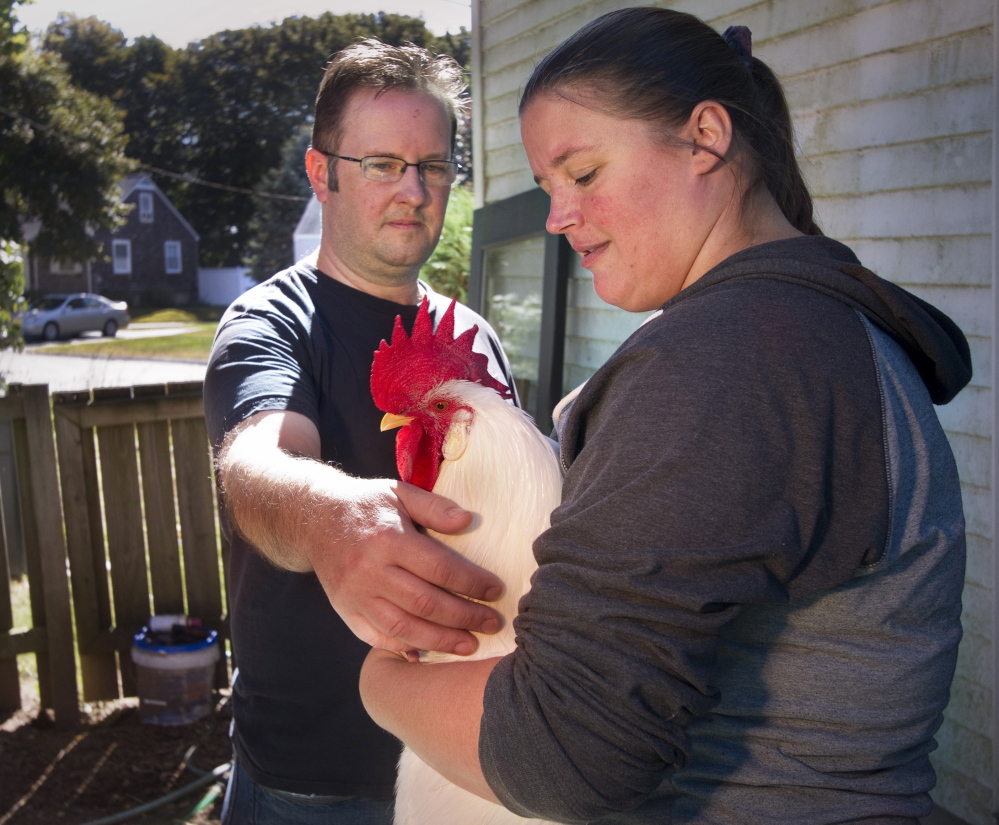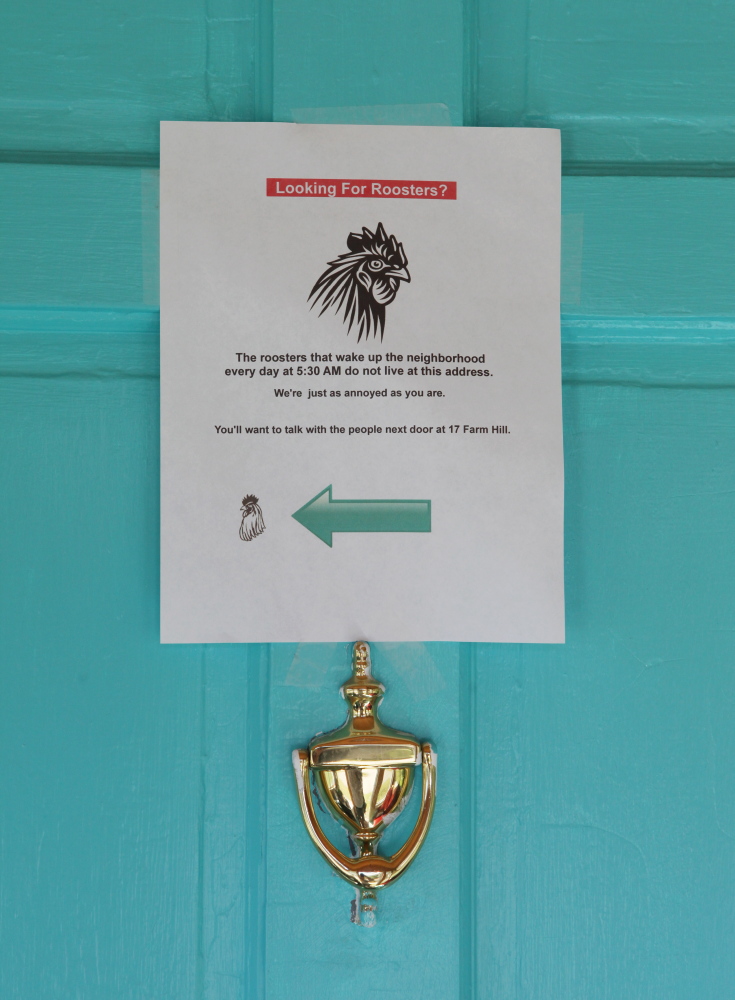CAPE ELIZABETH — A raucous rooster named Elvis has divided a dense family-filled neighborhood on Farm Hill Road, and the couple who own him are poised to fight an ordinance that would ban male chickens on small lots like theirs.
The Town Council’s ordinance committee has recommended that roosters be prohibited on lots smaller than 40,000 square feet. That’s a 200-by-200-foot parcel, or just under an acre. The full council is scheduled to consider the ban Oct. 6 and hold a public hearing Nov. 6.
Patrick and Crystal Kennedy say the proposed ban, coming amid a crowing controversy that started in July, is unconstitutional because it would discriminate against small-property owners and roosters.
“It’s economic discrimination because only people who can afford larger lots will be able to keep roosters,” said Patrick Kennedy, a computer technician. “And it’s discrimination by species because they’re singling out roosters.”
The Kennedys, who have seven children, said barking by their dog and other dogs in the neighborhood is louder than Elvis’ crowing, yet no one has threatened to ban dogs. A town ordinance prohibits “loud, frequent and habitual barking, howling or yelping (that) shall disturb the peace.”
“It’s unreasonable to allow dogs and not allow roosters,” Patrick Kennedy said. “A dog barking is just as loud as a rooster crowing and it’s not necessarily more frequent.”
Crystal Kennedy added: “This is a family neighborhood. There are going to be kids playing and dogs barking. You can’t expect peace and quiet.”
The rooster, named Elvis after a family trip to Graceland in June, grew from one of six chicks the Kennedys brought home in April. Five were male. They gave away the other roosters and sound-proofed the coop to muffle the crowing, but that didn’t stop the complaints.
Now, the Kennedys have only Elvis and two hens, which just started laying eggs. But Elvis, with his snow-white feathers and bright red, rubbery comb and wattle, is the clear favorite. Standing in the backyard, Crystal Kennedy holds the bird gently with one arm, the way Paris Hilton might hold her favorite lap dog.
“He’s a pet,” she said. “He comes to me when I call. I can carry him around like this anytime. He hangs out with us.”
The Kennedys say the rooster uproar is the latest expression of antagonism toward them in a neighborhood that has a “toxic” culture of intolerance. A densely populated subdivision off Route 77 and Scott Dyer Road, it’s lined with mostly modest capes on small lots where neighbors can see from one backyard to the next.
In recent years, neighbors have chided the Kennedys for their unkempt front lawn, which is strewn with rock piles, weeds, dug-up shrubs and other debris. They’ve lashed out when the Kennedy kids have practiced musical instruments or jumped on the large trampoline in the backyard.
Neighbors differ in their assessment of the Kennedys, their property and Elvis. Some say they don’t mind the crowing but are annoyed by the untidy yard. Others say the rooster issue tops a variety of neighborhood concerns.
At a house next door to the Kennedys, a computer-printed sign posted on the front door reads: “Looking For Roosters? The roosters that wake up the neighborhood every day at 5:30 a.m. do not live at this address. We’re just as annoyed as you are. You’ll want to talk with the people next door.”
For Tamara Tuttle, it’s all about the cock-a-doodle-doo.
“A rooster doesn’t belong here,” said Tuttle, who lives two houses away from the Kennedys with her four children.
Tuttle said the crowing happens throughout the day, with individual crows happening every 20 to 30 seconds, for 10- to 30-minute stretches. She recalled one evening a few weeks ago, when her mother was visiting for a barbecue on her back deck. Elvis crowed for 10 minutes straight, interrupting their conversation and relaxation.
“That thing just kept going and going and going,” Tuttle said. “It’s like someone honking their horn outside your house every 20 or 30 seconds. After a while, it gets pretty irritating.”
Tuttle said many neighbors are frustrated because the Kennedys “seem to think this is a ‘neighborhood’ issue and not a ‘them’ issue. But we’re not all wrong. It’s not us, it’s you.”
If the council approves the ban, Patrick Kennedy said, he may fight it and try to “illuminate” the community about the psychological process of “habituation,” which happens when people get used to repeated loud noises.
“I wish people had more patience and could get used to things before they call police and raise a ruckus,” Kennedy said. “The next time somebody doesn’t like something about me or my house, will I have to get rid of it?”
Copy the Story LinkSend questions/comments to the editors.





Success. Please wait for the page to reload. If the page does not reload within 5 seconds, please refresh the page.
Enter your email and password to access comments.
Hi, to comment on stories you must . This profile is in addition to your subscription and website login.
Already have a commenting profile? .
Invalid username/password.
Please check your email to confirm and complete your registration.
Only subscribers are eligible to post comments. Please subscribe or login first for digital access. Here’s why.
Use the form below to reset your password. When you've submitted your account email, we will send an email with a reset code.